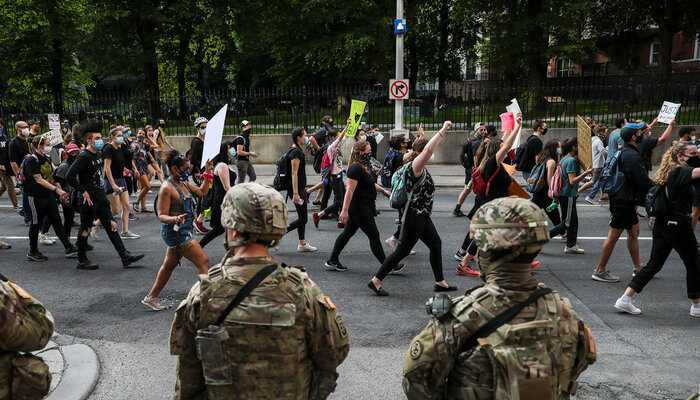Elizabeth Goitein, senior director of the Brennan Center’s Liberty and National Security Program, explains why reforming the Insurrection Act can’t wait.
What is the Insurrection Act and what makes it dangerous?
The Insurrection Act is what we call an amalgamation of statutes passed by Congress between 1792 and 1871. It authorizes the president to deploy federal military forces inside the United States to suppress insurrections, rebellions, or domestic violence or to enforce the law when it is being obstructed. Under the 1878 Posse Comitatus Act, federal military forces are generally barred from participating in civilian law enforcement activities. The Insurrection Act is the most significant exception to that rule.
The act was intended for use in emergencies in which civilian law enforcement is overwhelmed. But the criteria for deployment are set forth in vague and archaic language that provides few clear constraints. There are no meaningful checks against abuse. The original version of the law included requirements for congressional and judicial approval, but these provisions were later deleted. Today, the president has sole discretion to determine when the criteria for deployment are met.
As a result, the act grants presidents extremely broad and effectively unreviewable discretion to use the federal armed forces as a domestic police force. Such power creates undeniable dangers to individual liberties and to democracy itself.
How has the law been used in the past?
Presidents Dwight D. Eisenhower and John F. Kennedy used the act multiple times to enforce desegregation and civil rights laws. Those are the best-known examples of its appropriate use. But in the 19th century, presidents frequently invoked it to help quash labor movements, intervening in strikes on employers’ behalf. It was also used to quell so-called race riots sparked by local authorities’ mistreatment of Black people in the 1960s in Newark and Detroit.
On balance, though, it is remarkable how little abuse there has been of this potent authority. In recent decades, presidents have shied away from using the act at all. It was last invoked in response to the 1992 Los Angeles riots over the acquittal of police officers for beating Black motorist Rodney King, and it has not been used without the request of a state governor since 1965. This reticence likely results from a combination of factors, including the increased capacity of civilian law enforcement agencies and the likelihood of political blowback.
Despite these strong norms, Donald Trump considered using the law to suppress protests against the police killing of George Floyd in 2020. And he has threatened to invoke it to crack down on protests if he takes office again. So there is ample reason to worry about potential abuse.
How should Congress change the law?
The Brennan Center has published a multi-prong proposal for comprehensive reform of the Insurrection Act. First, the law should more clearly and narrowly define the criteria for military deployment, and it should stipulate that such deployment is reserved for emergencies that civilian law enforcement authorities cannot or (in the case of state or local governments) will not handle.
Second, the law should specify what actions federal armed forces may and may not take once deployed. For instance, invoking the Insurrection Act should not entitle the president to suspend habeas corpus. Similarly, federal troops should always act in support of, and remain subordinate to, civilian authority. In short, the Insurrection Act should make federal troops available to supplement civilian law enforcement efforts, but it should not be a license to declare martial law.
Third, the law should establish checks against abuse, including requirements for congressional approval and judicial review. The authority to deploy troops should automatically expire after a short period unless extended by Congress. And judicial review should be available, albeit with a very deferential standard of review to ensure that judges are serving as checks against abuse rather than substituting their judgment for the president’s in a true emergency.
What are the prospects for reform?
Change will require bipartisan support. The Insurrection Act is a dangerous tool in the hands of any president, and it should be reformed regardless of who occupies the White House in 2025. There is reason for optimism. In recent years, emergency powers reform has attracted broad bipartisan support under both the Trump and the Biden administrations. The Insurrection Act is an emergency power in all but name, and it triggers the same fundamental concerns. There is thus real potential for a successful, bipartisan effort to reform the Insurrection Act.



